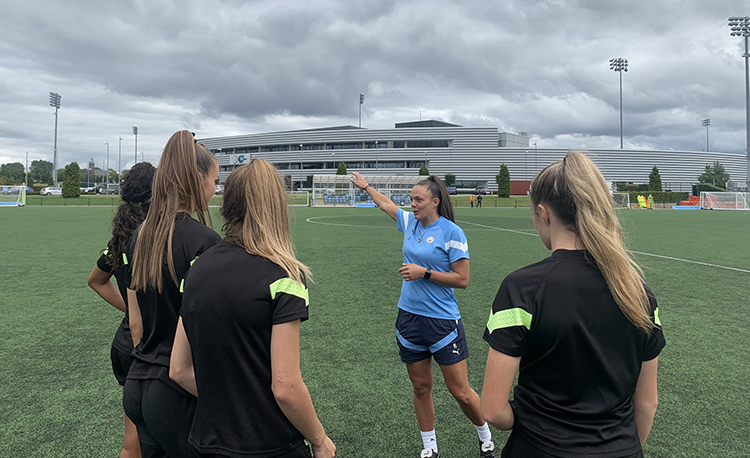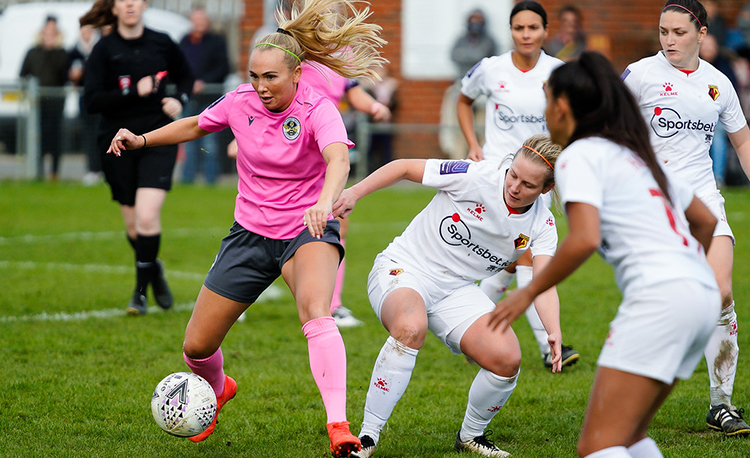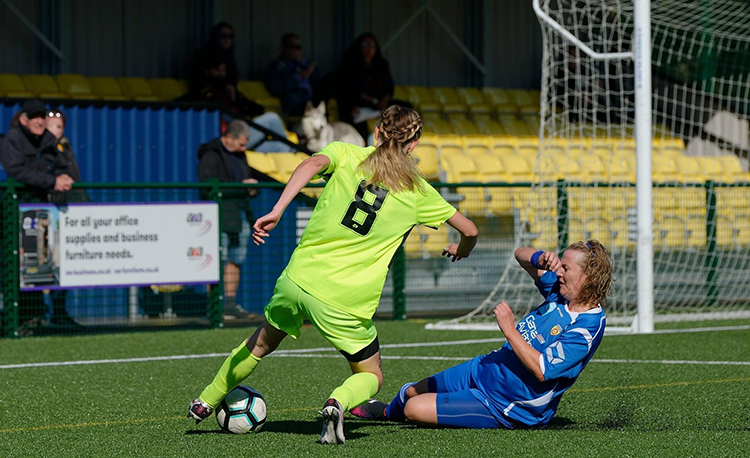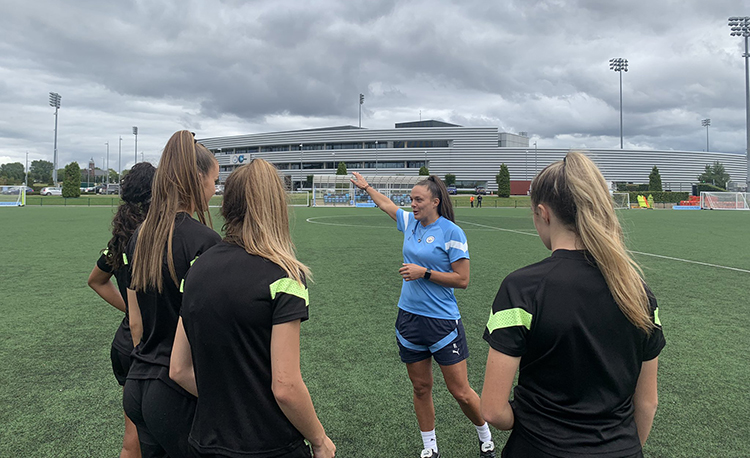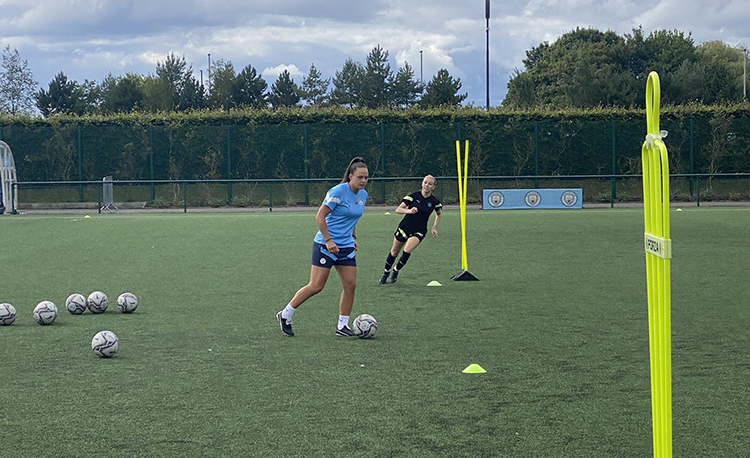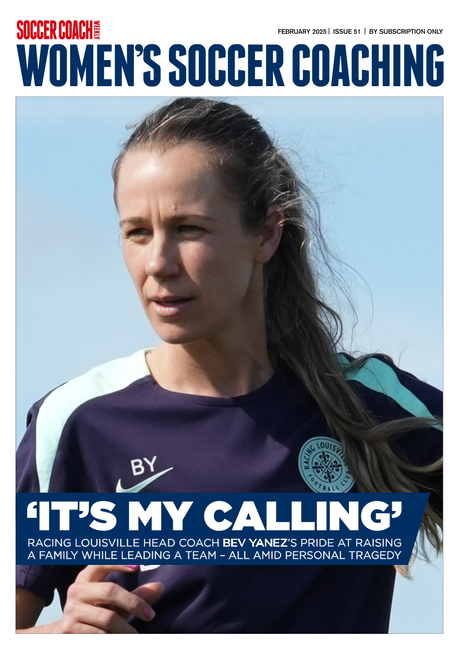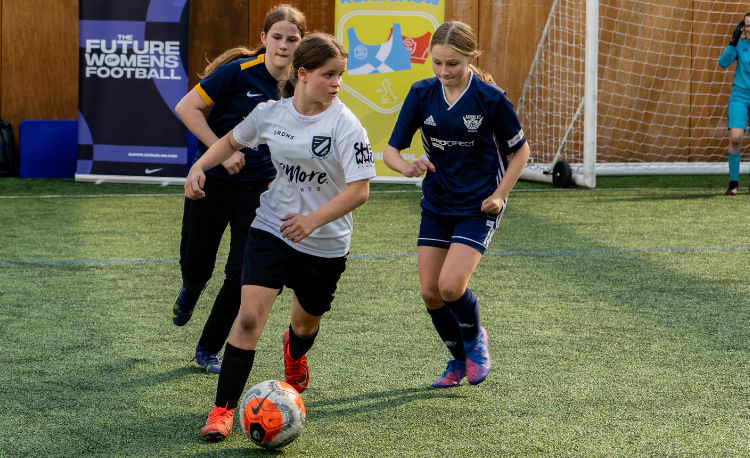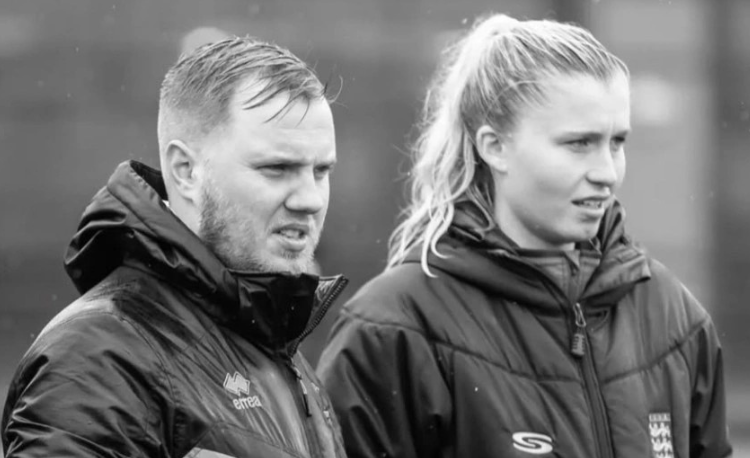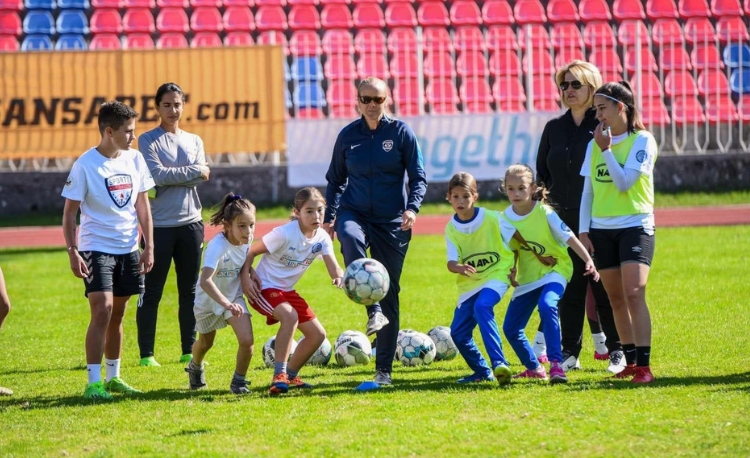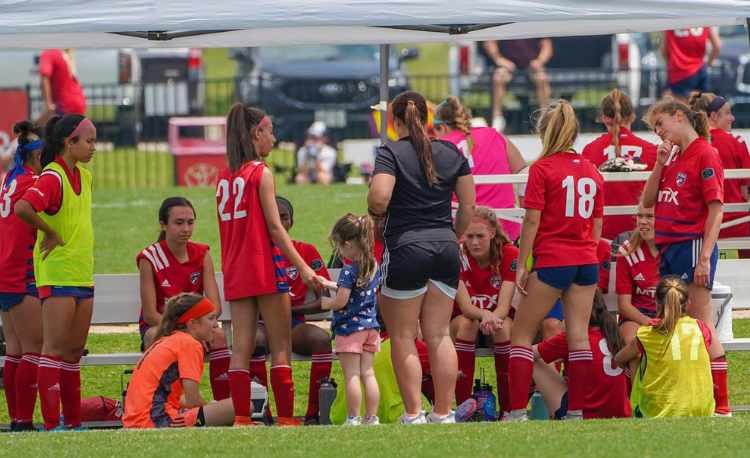You are viewing
1 of your 3 free articles
Rachel Lever: How one soccer coach lives with endometriosis
Manchester City Women’s academy boss Rachel Lever coaches while suffering the debilitating effects of endometriosis. She discusses it for the first time
Rachel Lever is women’s youth academy manager at Manchester City, overseeing the under-16s and under-21s. She also lives, and coaches, with endometriosis.
It is a debilitating condition, where tissue similar to the lining of the womb starts to grow in other places, such as the ovaries and fallopian tubes.
Some of the key symptoms include severe pain that stops or restricts normal activity, feeling sick, heavy periods and, sometimes, fertility problems.
Heavy periods are something that Lever has struggled with since she was young.
“Even as a youngster, I was more or less bleeding every two weeks,” she told Women’s Soccer Coaching.
“I didn’t know that it would come to this – that I’d be 30 years old with endometriosis and having to have surgery.”
In the UK, it takes, on average, eight years - yes, years - for someone to be diagnosed with endometriosis.
Lever describes herself as “fortunate” for being diagnosed after just a couple of years.
But it wasn’t good luck that got her the diagnosis. It was advocating for herself at a time when she knew something was really wrong.
Lever used to teach gym classes alongside her coaching work. She remembers one class in particular as a turning point for her.
“When I exercised, the pain was ridiculous. I was bent over and couldn’t move...”
“When I did exercise, the pain was ridiculous,” she said. “I remember being bent over outside the gym classroom. I couldn’t move.
“I had to get someone to come and pick me up because I actually couldn’t even make it back to my car to drive home.
“The pain was just…I can’t even describe it. I just remember how it feels.”
That was the point where she decided she had had enough and decided to make a concerted push for an answer with medical experts.
Scans can’t definitively prove endometriosis – keyhole surgery through the stomach, called a laparoscopy, is the ultimate way to diagnose the condition – yet Lever’s scans indicated that it was, indeed, endometriosis.
Getting the scan done, though, was a fight in itself.
“I remember turning up to an appointment one day and they said, ‘Oh no, we’re not going to do it’,” she recalls.
“I told them I was going to wait around. I waited for five hours. I was that annoyed and wanted to get to the root of it.
“I had a bit of an argument with them in the corridor. I was frustrated, I just felt like I was being palmed off all the time.”
Lever’s exasperation stemmed not just from the symptoms she was dealing with, but the impact it was having on her livelihood.
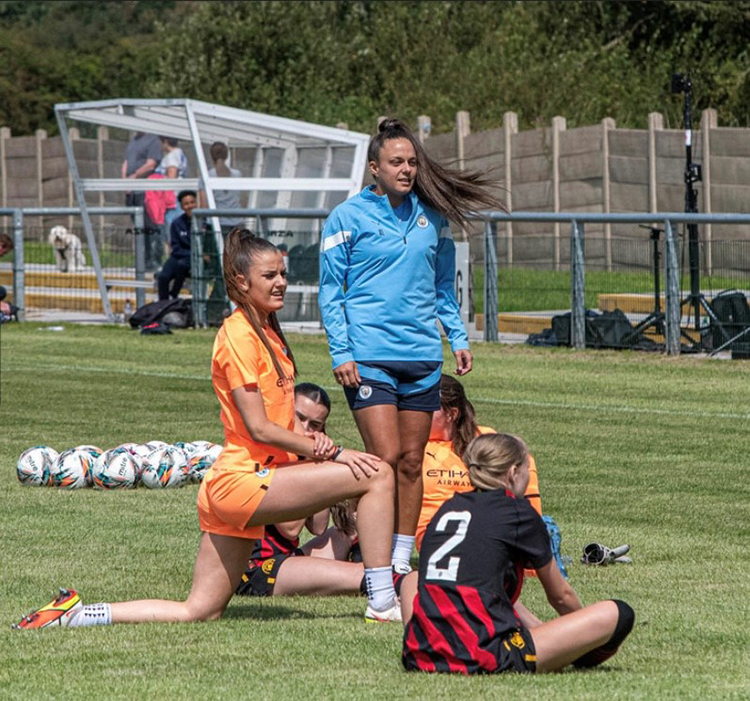
Strenuous tasks while coaching - such as moving goals - were painful. In fact, any physical activity could be a struggle.
She had to have surgery to help manage the condition - taking time off work as a result - and knows she will have to go through it again due to the recurring nature of endometriosis.
Pumped-up balls, clean bibs and hidden gems – Lever on how her grassroots experiences translated to Manchester City
“At Manchester City, it’s a whole different kettle of fish. We don’t need to carry equipment round.
|
Lever is a respected coach in the City set-up, having started with the U12s squad in 2016. Yet her coaching career wasn’t necessarily planned.
Suffering from epileptic fits meant she lost a job she was in. When she, in her words, “was trying to get her life back on track,” her father suggested she return to what she loved – soccer.
She opted to get her first coaching badge, and got involved with a local grassroots club, Chester Nomads, where her nieces played.
She was the team’s first female coach and ended up staying involved with them for the best part of nine years.
“Even when I was working at City, I still volunteered there because they really helped me,” she says.
“When I was doing my FA Level 2 coaching badge, all the parents chipped in to help me pay for it. I enjoyed giving back to what they gave me.”
Lever also spent some time coaching in the community with Tranmere Rovers, the club where she played growing up.
The experience of community coaching – working in walking soccer, disability soccer, in small spaces not designed for the game, or with limited equipment – opened her eyes to alternative ways of working.
These experiences have moulded the coach she is today. Lever also lectures in football coaching and management at the University Campus of Football Business (UCFB).
Reflecting on her time as a player, Lever has thoughts on how coaches may be able to support any players with endometriosis.
“Managing load is really important,” she says. “There might be a point during the month where it is actually a lot tougher for a player to do HSR [high-speed running] or to compete at a really intense level for a long period of time, even if it’s just an hour.
“It doesn’t sound like much, but after I’d worked at a high intensity, I’d have to sit down, sometimes for the rest of the session.
“[Other times] I’d just walk a little bit until the pain eased off, then I might get a few more sprints out and then I might just be able to jog a little bit.
“It is just a case of minding load and checking in on players continuously.
Related Files
“If you can, observe the body language as well. You can see when someone is in pain or uncomfortable.
"If you can share your stories, then it might help someone else get diagnosed..."
“Make it an open conversation so that they can say if they can’t carry on. Let them know that that’s okay.
“[It might be you say] ‘We’re doing extra fitness today, but you can sit out because I understand the kind of the pain you’re going through at this moment in time’.
“It’s just a case of opening up conversation and being comfortable to speak about it.”
Opening up is something Lever does throughout the interview. But she also reveals she has not discussed her experiences with endometriosis before.
“I’ve not opened up, spoken about it previously, or spoken about it within my role. It’s just not something that’s really brought up that often,” she reflects.
It’s clear that, for Lever, this is something that has to change. Indeed, a conversation with a friend who suffered from the condition was key in her pushing for a diagnosis, and Lever has since paid that forward.
“I worked with a player previously who had the same kind of pain,” she said. “I shared my story with her. She then went away and was diagnosed with it.
“If you are someone who has got experiences in that realm, and you are willing to share your story with others with that pain, it’s important.
“Some people don’t know what it is, some people are never told, or they don’t go to the doctors because they think it’s just their period and that’s how it’s meant to feel, or they’re just unfortunate that they get it worse than others.
“If you can share your stories then it might help someone else get diagnosed.”
More conversation and education around periods in general in the girls’ and women’s game is something Lever is passionate about - and it’s something that City have been working on.
“We’re quite fortunate in that respect,” she says. “We have people come in and they speak to us as a coaching group about it.
“For some guys working in the environment, it’s been a little bit of an eye opener, and it’s good for them.”
And what about those not working in elite environments - those coaching in grassroots, the environment that taught Lever her trade and that she’s still so passionate about?
“It is just a case of opening up the conversation a little bit,” she says.
“Let them know that you’ve got supplies. If you’re at grassroots, have a supply of pads or tampons in the medical bag so that if girls come on their period while playing a game, they don’t have to worry.
“It should be something that’s accessible to everyone, so if coaches are different every week, they still remain in that bag.
“It could be something as simple as that - just letting the girls know that it’s there, it’s a safe space, and they’re more than welcome to just go over and help themselves.”
Lever says ‘safe space’ numerous times during our conversation. And she means it in every sense – from the physical space where we might keep pads and tampons for our players, to the spaces we can create and hold for conversation and reflection with our coaching colleagues and our players.
It’s on us to create those safe spaces.
Endometriosis: learn about the key facts and figures
What is endometriosis?It is a condition where tissue similar to the lining of the womb starts to grow in other places, such as the ovaries and fallopian tubes. They react in the same way to those in the womb, building up and then breaking down and bleeding. However, unlike the cells in the womb that leave the body as a period, this blood has no way to escape, causing severe pain.
It is important to remember that endometriosis is not an infection, is not contagious and is not cancer. It is pronounced en–doh–mee–tree–oh–sis.
Who does endometriosis affect?There are an estimated 176 million people worldwide living with endometriosis. It can affect people of any age, from puberty to menopause. It is estimated that 10% of people worldwide that have periods live with endometriosis.
What are the key symptoms?Some of the symptoms include severe pain that stops normal activity, feeling sick and/or fatigued, heavy periods and, sometimes, fertility problems.
What causes it?The actual cause of endometriosis is unknown. There are several theories, but none fully explains why endometriosis occurs.
What cures or treatments are there?8 years is the average time in the UK from the onset of symptoms to formal diagnosis. While there is currently no cure for endometriosis, treatments can help to manage the condition. Surgery can be used to alleviate pain by removing the endometriosis, dividing adhesions or removing cysts.
I think I MAY have endometriosis - what should I do?If you think you have symptoms of endometriosis, it is vital you speak to a healthcare professional.
Global resourcesUnited States - www.endofound.org Canada - www.endometriosisnetwork.com Australia - www.endometriosisaustralia.org Europe - www.euroendometriosis.com
Source: www.endometriosis-uk.org
|
Newsletter Sign Up
Newsletter Sign Up
Discover the simple way to become a more effective, more successful soccer coach
In a recent survey 89% of subscribers said Women's Soccer Coaching makes them more confident, 91% said Women's Soccer Coaching makes them a more effective coach and 93% said Women's Soccer Coaching makes them more inspired.
*includes 3 coaching manuals
Get Inspired
All the latest techniques and approaches
Women's Soccer Coaching offers proven and easy to use soccer drills, coaching sessions, practice plans, small-sided games, warm-ups, training tips and advice.
We've been at the cutting edge of soccer coaching since we launched Soccer Coach Weekly in 2007, creating resources for the grassroots youth coach, following best practice from around the world and insights from the professional game.
